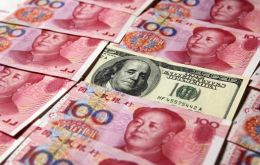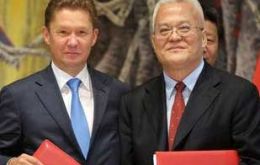MercoPress. South Atlantic News Agency
Tag: Yuan
-
Friday, August 14th 2015 - 09:58 UTC
China and Asian markets begin to react to new Yuan daily rate-fix policy

Chinese shares rose on Friday as the central bank set the reference rate for the Yuan slightly stronger. The bank set the rate at 6.3975 per dollar compared to Thursday's close of 6.3982.
-
Thursday, August 13th 2015 - 06:17 UTC
For third consecutive day China weakens the Yuan against the US dollar

The People's Bank of China (PBoC) weakened the Yuan against the dollar for a third consecutive day on Thursday, following reports the central bank intervened to stem the currency's sharp slide late on Wednesday. The PBoC set the Yuan fixing at 6.4010, compared to the previous day's close of 6.3870, sending the currency 0.7% lower to 6.43 per dollar in early trade.
-
Wednesday, August 12th 2015 - 15:18 UTC
China's devaluation triggers fears of a new round of currency wars

China's shock 2% devaluation of the Yuan pushed the dollar higher and raised the prospect of a new round of currency wars, just as Greece reached a new deal to contain its debt crisis. Stocks fell in Asia and Europe as investors worried about the implications of a move designed to support China's slowing economy and exports.
-
Wednesday, August 12th 2015 - 07:51 UTC
Wednesday’s China shockwave: Yuan devalued 1.6%; IMF support, US Treasury cautious

Chinese shares were lower on Wednesday as its central bank again devalued the yuan, following Tuesday's record cut. The People's Bank of China fixed the daily guiding rate for the currency down 1.6% to 6.3306 against the dollar.
-
Monday, April 20th 2015 - 06:24 UTC
China cuts banks' reserve ratio to bolster lending and a weak economy

China's central bank is to cut its bank reserve requirement ratio by one percentage point. The People's Bank of China said that the new reserve requirement would take effect from Monday. The aim is to stimulate more lending into the nation's slowing economy.
-
Tuesday, April 14th 2015 - 18:35 UTC
China's exports/imports fall in March; trade surplus lowest in 13 years

China's monthly trade data shows exports fell in March from a year ago by 14.6% in Yuan terms, compared to expectations for a rise of more than 8%. Imports meanwhile fell 12.3% in Yuan terms compared to forecasts for a fall of more than 11%.
-
Tuesday, March 3rd 2015 - 06:24 UTC
Dollar on Monday at an eleven year peak against major currencies

The dollar rose on Monday against major currencies touching an 11-year peak. The Euro, which has been in an extended slump, had been up by as much as a third of a percent against the dollar but surrendered gains and traded near unchanged at just under $1.12.
-
Wednesday, November 19th 2014 - 07:19 UTC
Short of dollars, Argentina appeals to China's Yuan to boost reserves

The Argentine Central Bank received this week the second part of a multi-billion dollar currency swap with China’s Central Bank, worth the equivalent of 508 million dollars. The swap allowed Argentina to bolster its foreign reserves, which rose 506 million and closed at 28.785 billion dollars.
-
Wednesday, November 5th 2014 - 06:43 UTC
The end of an era: Is the US petrodollar under threat?

Recent trade deals and high-level cooperation between Russia and China have set off alarm bells in the West as policymakers and oil and gas executives watch the balance of power in global energy markets shift to the East.
-
Friday, October 31st 2014 - 08:08 UTC
Chinese relief for Argentina: central banks activate currency-swap

The central banks of Argentina and China on Thursday activated a bilateral currency-swap agreement, which meant that the Argentine central bank received an initial tranche of Yuan equivalent to 814 million dollars.
